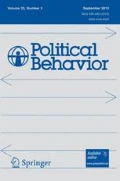Abstract
Empirical political behavior research has consistently observed a robust and positive relationship between education and political engagement, but has failed to adequately explain why education is so important. Using data from the Baccalaureate and Beyond (B&B) Longitudinal Study, I test three competing hypotheses explaining the enduring link between higher education and political behavior. I find that a verbal SAT scores and a social science curriculum are related to future political engagement, suggesting that the content of higher education, especially a curriculum that develops language and civic skills, is influential in shaping participation in American democracy.
Similar content being viewed by others
References
Anne Anastasi (1976) Psychological Testing EditionNumber4 Macmillan New York
Baccalaureate and Beyond Longitudinal Study: 1993/1994 Methodology Report, Washington, DC: US Department of Education, National Center for Education Statistics, 1996.
Richard Brody (1998) The puzzle of participation in America Anthony King (Eds) The New American Political System American Enterprise Institute Washington, DC.
Barbara Burrell (1994) A Woman’s Place Is In the House University of Michigan Press Ann Arbor
Pam Conover Donald Searing (2000) A political socialization perspective L. McDonnel P. Timpane R. Benjamin (Eds) Rediscovering the Democratic Purposes of Education University Press of Kansas Lawrence, KA
Philip Converse (1972) Change in the American electorate Angus Campbell Philip Converse (Eds) The Human Meaning of Social Change Russell Sage Foundation New York
Murray Edelman (1977) Political Language: Words that Succeed and Policies that Fail Academic Press, Inc New York
William A. Galston (2001) ArticleTitlePolitical knowledge, political engagement and civic education Annual Review of Political Science 4 217–234
Green, Patricia, Myers, Sharon, Veldman, Cynthia, and Pedlow, Steven (1999). Baccalaureate and Beyond Longitudinal Study: 1993/97 Second Follow-up Methodology Report, July 1999. http://nces.ed.gov/pubsearch/pubsinfo.asp?pubid=1999159.
Richard J. Herrnstein Charles Murray (1994) The Bell Curve: Intelligence and Class Structure in American Life The Free Press New York
Robert D. Hess Judith V. Torney (1967) The Development of Political Attitudes in Children Aldine Chicago
Ben Highton Raymond Wolfinger (2001) ArticleTitleThe first seven years of the political life cycle. American Journal of Political Science 45 IssueIDJanuary 2002–2009
Christopher Jencks M. Smith H. Acland M. Bane D. Cohen H. Gintis B. Heyns S. Michelson (1972) Inequality: A Reassessment of the Effects of Family and Schooling in America Basic Books New York
Levine, Peter and Lopez, Mark H. (2004). Themes Emphasized in Social Studies and Civics Classes: New Evidence. CIRCLE fact sheet.
Robert C. Luskin (1990) ArticleTitleExplaining political sophistication Political Behavior 12 IssueID4 331–355
Warren E. Miller J. Merril Shanks (1996) The New American Voter Harvard University Press Cambridge, MA
W. Russel Neuman (1986) The Paradox of Mass Politics: Knowledge and Opinion in the American Electorate. Harvard University Press Cambridge, MA
Norman H. Nie D. Sunshine Hillygus (2001) Education and democratic citizenship: explorations into the effects of what happens in pursuit of the baccalaureate Diane Ravitch Joseph Viteritti (Eds) Education and Civil Society Yale University Press New Haven, CT
Norman H. Nie Jane Junn Kenneth Stehlik-Berry (1996) Education and Democratic Citizenship in America University of Chicago Press Chicago
Richard Niemi Jane Junn (1998) Civic Education: What Makes Students Learn Yale University Press New Haven
Michael Olneck James Crouse (1979) ArticleTitleThe IQ meritocracy reconsidered. American Journal of Education 88 1–31
Eric Plutzer (2002) ArticleTitleBecoming a habitual voter: inertia, resources, and growth in young adulthood. American Political Science Review 96 IssueID1 41–56
Steven Rosenstone John Mark Hansen (1993) Mobilization, Participation, and Democracy in America Macmillan New York
Todd G. Shields Robert K. Goidel (1997) ArticleTitleParticipation rates, socioeconomic class biases, and congressional elections: A cross-validation, 1958–1994. American Journal of Political Science 41 683–691
Santa Traugott (1989) Validating self-reported vote: 1964–1988. National Election Study Technical Report 34 University of Michigan Ann Arbor, MI
J. Torney-Purta J. Schwille J. Amadeo (1999) Civic Education Across Countries: Twenty-Four National Case Studies from the IEA Civic Education Project International Association for the Evaluation of Educational Achievement Amsterdam, The Netherlands
Sidney Schlozman Verba Kay Lehman Henry E. Brady (1995) Voice and Equality: Civic Voluntarism in American Politics. Harvard University Press Cambridge, MA
Raymond Wolfinger Steven J. Rosenstone (1980) Who Votes? Yale University Press New Haven
Author information
Authors and Affiliations
Corresponding author
Additional information
Analysis for this article relied on restricted-use data from the National Center for Education Statistics. Application procedures for obtaining an NCES restricted data license to access the␣Baccalaureate and Beyond Longitudinal Study are available at http://nces.ed.gov/surveys/b&b/. Replication code and supplemental variables (including school quality) are available on␣the author’s website.
Rights and permissions
About this article
Cite this article
Sunshine Hillygus, D. The MISSING LINK: Exploring the Relationship Between Higher Education and Political Engagement. Polit Behav 27, 25–47 (2005). https://doi.org/10.1007/s11109-005-3075-8
Issue Date:
DOI: https://doi.org/10.1007/s11109-005-3075-8




